What does it mean to learn? In this episode, the Fellows reflect on what they’ve learned at college and beyond. There are stories about Swarthmore professors, perspectives on workload, and even a story on the importance of a good chest pass.
You can enjoy the episode in its entirety or listen to segments from particular Fellows.
Frank 5 Episode 2 (Learning & Discovery): Full Episode
What does it mean to learn? In this episode, the Fellows reflect on what they’ve learned at college and beyond.
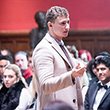 “There’s no more interesting language than basketball.”
“There’s no more interesting language than basketball.”
Sam Sussman ’13 speaks with Professor Krista Thomason.
Sam is the co-founder of Extend, a start-up NGO focused on conflict resolution education in Israel-Palestine. He’s also an award winning screenwriter.
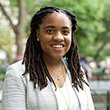 “It wasn’t a nice and pretty story of how I learned more about myself.”
“It wasn’t a nice and pretty story of how I learned more about myself.”
Marissa Davis ’08 speaks with Professor Rachel Buurma.
Marissa is a bridge-figure, social engineer and advocate for creating sustainable pathways to a better quality of life for historically disenfranchised communities.
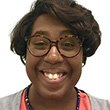 “I always had a chip on my shoulder about being an ‘admissions mistake.'”
“I always had a chip on my shoulder about being an ‘admissions mistake.'”
Kimberly St. Julian-Varnon ’12 speaks with Professor Sa’ed Atshan.
Kimberly is a high school history teacher and community college professor. She’s also a Texan, African-American woman, Russian-speaker, and Magic the Gathering player.
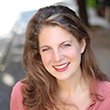 “There are skills I gained at Swarthmore that I’m grateful for.”
“There are skills I gained at Swarthmore that I’m grateful for.”
Nell Bang-Jansen ’11 speaks with Professor Tim Burke.
Nell is a Philadelphia-based theater director and creator and is currently working on a theater piece made with and for people who work as caregivers.
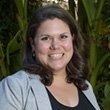 “I don’t think people in their college career say, “I need to change how I learn.””
“I don’t think people in their college career say, “I need to change how I learn.””
Kara Peterman ’09 speaks with Professor K. Elizabeth Stevens.
Kara is a structural engineering experimentalist who joined the department of Civil and Environmental Engineering at UMass Amherst in 2016. She is passionate about outreach and has promoted the advancement of underrepresented groups in engineering for over a decade.
Frank 5 Episode 2 (Learning & Discovery): Transcript
Tim Burke: It’s the Frank Five Fellows Podcast Series, informal conversations with recent liberal arts grads from the worlds business, engineering, education, and the arts. In this episode, the fellows and their faculty partners reflect on what they’ve learned about themselves at college and beyond. There are stories about swathes more professors, perspectives on workload, and even a story on the importance of a good chest pass. Up next, Sam Sussman and Krista Thomason.
Sam Sussman: There’s no more interesting language for me to understand than people who are different more effectively than basketball. There’s just no other language. It’s true. In the past five years, I’ve played basketball in probably a dozen countries, oftentimes with people I share no common language. It’s a sport like any sport, especially this one, that relies so much on timing, and communication, and the expectation of what the other person’s going to do, and every culture plays it differently. A few summers ago, I spent a good chunk of time in China, and a good chunk of time in Taiwan, and the styles there were so different. It was remarkable. Taiwan is much more shooter’s game. I could play that all day.
At least when I was in Beijing and Shanghai, it was like a game of power forwards. I was done. I couldn’t play with these guys. I think that oftentimes, unless the form of communication has some sort of cultural prestige or capital, unless it’s like music, classical music, if it’s not analytic, we often just forget it as a way of communicating, and I think for years, I forgot about basketball.
Krista Thomason: So, I wonder if you could go back a little bit to you were talking about the shift when you got to Swarthmore, really valuing analytic ways of doing things, analytic intelligence. I was wondering if you could talk a little bit about maybe a particular moment at Swarthmore where you realized hey, maybe this isn’t the way to go about things, or maybe this isn’t the only way to think, or maybe there are other things that I’m sort of missing out on by hyper focusing on this particular type of intelligence.
Sussman: Sure. So, when I was a senior, I’d spent my sophomore year abroad at Oxford, and I really loved that environment, and I wanted to come back for grad school. I applied to all the scholarships that were out there for that, and I got a final interview for the Road Scholarship, and I did a lot of research on it, and I read an article that, in retrospect, I wish I had never read, and if you’re listening to this podcast, don’t go read this article. It’s the worst thing that could happen to you. It was a New York Times article from the 1990s, and it was summarizing the experience of people who interview as Road’s national finalists, and it described this one young man who was asked the question “You have one minute to talk to the prime minister of India about ethnic violence.
What would you say?” And I thought, oh gosh, alright, I better have one minute answers about everything in my field, and I was a senior in college, so it was pretty broad, my range of interests. So, to me, this is like the ultimate fetishization of that sort of superficial intelligence. If you had one minute to solve the most complex human problem, which is how do people with different backgrounds coexist, what would you say? It’s like once someone asked [inaudible 00:04:02] Nolan Tronsky if you had one minute to convince George W. Bush to end the Iraq War, what would you say, and Tronsky said no, you’ve totally misunderstood my political critique. I think that foreign policy is essentially a matter of all these structural forces well beyond the control of this particular presence.
So, if I had one minute, I would just ask him “Has God said anything to you interesting lately?” So, that’s how I feel about this sort of question, but at the time, I was thinking wow, I really have to prove how cerebral I am. So, I developed all these one minute responses that were totally ridiculous, incredibly pompous, highly unuseful, wouldn’t have reduced ethnic conflict if anyone had ever asked me, and then I got to the Road’s interview, and it turns out most of the questions they asked me were kind of interested in deep personal introspection. They didn’t care how much I knew about the ethnic conflict in India.
They cared how much I knew myself, and I realized that about 10 minutes after the interview ended. I realized wow, this is miserable. I worked so hard to convince these people that I have this certain sort of intelligence that our culture obsesses over, but the truth is they didn’t care. They just assumed well, yeah, if you get called in for final round interviews to a graduate program at Oxford, you’re probably competent in your field. So, we don’t care about that. What we care is can you use that competence in a way that helps other people, and to do that, you have to know yourself pretty well. I think I came across as someone who didn’t know myself.
That was a moment of reckoning for me, and I very much did not get that scholarship. It made me think maybe I didn’t get this because I was too consumed with fetishizing a certain intelligence, but also, maybe I wanted this because I was too busy fetishizing a certain type of intelligence. I remember thinking winning this scholarship would’ve made me very happy. I would’ve been very proud, but it wouldn’t have made me a better writer. It wouldn’t have made me a better friend. It wouldn’t have made me better at any of the things that I really wanted to get better at, and I ended up having a year where I didn’t go to grad school, and I had a lot of time to discover new things about myself.
On a different scholarship, I ended up doing the same program that I wanted to do at Oxford, and it was a much, much better experience because I knew myself better. I knew what I wanted, and I wasn’t there trying to prove how intelligent I was. I was there trying to continue to get to know myself in better ways.
Burke: Up next, Marissa Davis and Rachel Burma.
Rachel Buurma: Were there ways in college that you came to start to understand or think about who you are? Were there people or practices, or situations that helped you begin that thinking, or was that something that happened after college?
Marissa Davis: Yeah, so I would say definitely college, and it actually wasn’t nice and producetory necessarily for how I learned more about myself. Really, my senior year, I was in the honors program. I was a history major. I was an RA, a resident assistant. I was also still leading this organization that, by my senior year, had become an organization that was still doing work in New Orleans and had taken on a bunch of other responsibilities that I probably shouldn’t have in hindsight, and I’d just piled up so much on my plate.
Eventually, I got a lot of things done, but it was a consequence of my wellbeing, my emotional, my physical wellbeing. There was definitely a point within that year where, honestly, I had become clinically depressed and just felt like there was just … that the idea of not being able to do any of those things well was terrifying that I thought that not being able to do any of those things well or putting some of those things to the side was compromising who I was as an individual, and so that was when it was kind of an aha moment for me.
I realized that so much of the things that I did was very much intertwined with who I thought I was, and that in many ways, the things that I did defined me or defined who I thought I was, and at least in that moment, as I was really struggling with things, I think I realized one, that wasn’t healthy for me and that wasn’t what I wanted. I actually wanted to feel and be okay with myself independent of all the things that I was doing, and so that really started this journey that I continued to be on to this day, and really trying to understand who I am, the things that make me happy, and then do things that make me happy.
Burke: Up next, Kimberly St. Julian-Varnon and Sa’ed Atshan.
Sa’ed Atshan: Now that you’re a few years out of college, do you have a different sense of what your skills or talents are?
Kim St. Julian-Varnon: I think I do. When I was at Swarthmore, I always had this chip on my shoulder about being the admissions mistake, and Jim Bock will always tell everyone there are no admissions mistakes, but I was sure he was wrong. I’m like no, I somehow broke the system, and so I was really afraid that my vocabulary was underdeveloped, or my writing wasn’t that great, or my reading skills weren’t what they needed to be, and now that I’m out of college and I have more perspective, my reading’s fine, my writing is great, I mean, Swarthmore will shape you, you will be able to think critically, and I think that the skills that I have, interpersonal skills, being able to multitask but also being able to manage different types of projects at the same time, those are skills that I honed at Swarthmore and that are totally necessary every day for a teacher.
Atshan: So, tell us a story from your college experience that helped you discover something about yourself.
St. Julian-Varnon: So many things. My first paper at Swarthmore, I got a grade, I got like a B minus or something, on this paper, and I was a straight A student from elementary school through senior year of high school. So, I got this B minus, and I melted down. I was like oh my god, they’re going to kick me out of college, I’m going to fail out, I can’t do this, I’m stupid, I am the admissions mistake, I was bawling my eyes out, and I had never been in that situation before, and so I just went to the professor and it was Doctor Weinberg, and I said can you help me because I don’t think I know what I’m doing, and he did. He helped me, and he taught me how to write, and we had these little weekly sessions. I’d go to his office, and he would help me, and I think what that taught me is that I do have perseverance, that I can definitely stick it out, but also, it taught me that asking for help is never a weakness, and that was something I hadn’t really learned yet.
Atshan: Well bless his heart also.
St. Julian-Varnon: Seriously.
Atshan: Bob Weinberg. That’s fabulous.
St. Julian-Varnon: I told him if I have kids, I’m naming all of them after him, even a girl.
Burke: Up next, Nell Bang-Jensen and Tim Burke.
Tim Burke: One of the things I wonder about a lot when I’m grading students, or evaluating them, or trying to get them to understand what they seem to be skilled at is that our mission is to nurture and encourage, and to sort of do that inside an academic environment, and I wonder often whether what I’m seeing in a student is going to be consistent with what the world sees in someone once they’re out of here. So, have you found that the things that you were told you were good at or rewarded for, or that the faculty here kind of gave you some sense of a positive assessment about are consistent with the things that you’ve discovered you’re good at or are drawn to doing now that you’re doing this professionally?
Nell Bang-Jensen:Yeah. That’s a good question. I think there are some consistencies. I think there are skills I gained at Swarthmore that I am immensely grateful I have now. First and foremost, probably writing actually. I think being able to write and articulate ideas in terms of speaking, and a lot of what I do now as a director is facilitating a room and managing people, and I think being able to engage in civil discourse in a way in which you’re listening but also being able to stand your ground is a lot of what we do in Swarthmore discussions and seminars, and really directly applies to my job now. I mean, I think in terms of a continuation of what I felt like I was good at or really was working on at Swarthmore into now a huge thing that I think Swarthmore gave me is actually confidence.
That’s, I think, sort of a hard skill to measure, but I do think the investment that the faculty and staff, and peers at Swarthmore put into each other, made me feel like I had a safety net to do certain things, and also that I could take risks because I knew there were people around to catch me. I mean, I was just thinking last night when I was reflecting on this about a first year seminar I took. It was Betsy Bolton’s Jane Austen seminar, and first of all, I was blown away that Jane Austen could actually be an academic study that I could take and discuss, and I was so excited by that, and it was my first college paper.
We had submitted little drafts or proposals for what we were going to do, and Betsy Bolton, as she should with first semester Freshmen, totally tore them apart, and I remember being so wounded because I felt like no, writing’s something I’ve been good at, and it destroyed me not to do well, and I remember I was talking to her about coming up with a thesis, and she said okay, I have to teach this other class, but we’ll continue this conversation, call me tonight. She gave me her home phone number, and I remember vividly, it was Halloween, and so I called her, and she picked up, and we would talk about the thesis I was creating for, I think Jane Austen’s persuasion, and we’d talk for about 10 minutes, and then she’d say hang on, I have trick or treaters, and she’d hang up and go deal with the trick or treaters, and then call me right back.
Over the course of sort of on and off phone calls over an hour, we narrowed in on this thesis, and she really pushed me to articulate it and figure out how to support it, but she was there for me that evening to talk through that process, and it was a process I used throughout my time at Swarthmore, and I think today, just feeling like I’ve been through a process that required me to keep going and be persistent but have the confidence that people had my back has been immensely helpful.
Burke: Up next, Cara Peterman and Elizabeth Stevens.
K Elizabeth Stevens: What one gets from college in general besides learning this set of skills et cetera, and learning from different disciplines in a liberal arts context, there’s also the notion of learning how to learn or kind of developing thinking strategies, learning strategies, curiosities, that are more vague or difficult to define I should say, and I’m wondering if you could talk a little bit about those and if they influence the way you teach now.
Kara Peterman: Yeah. It’s one of those things that I don’t think anybody at any point in their college career says oh, I’ve got to change how I learn, or they recalibrate. It’s hard to be cognizant. So, looking back over my life as a student both as an undergrad and in graduate school, and even now, I mean, I’m constantly learning things, the thing that strikes me is how much I learn from doing something not related to the thing I want to learn. This happens to me constantly where I’m mulling over something I’m not quite understanding, or a technical problem, or what have you, and when I give my brain a chance to engage in something else, whether it’s even looking at the art on my walls in my office, or whether it’s having a political discussion with a student or a colleague, or even just walking around, it’s amazing how that change in both physical setting but also mental setting kind of engages my brain to use different muscles in that sense.
I know that’s not really how brains work, but to use different muscles and come to a better solution or come to a better understanding, and this was something that I’ve actually learned through my own experience was that sort of starting off in a liberal arts, I almost need liberal arts at this point in my life. I’m an avid classical musician, I love art, I studied a little bit of art history in college and it made me a big fan as an adult and as a post-college graduate, and I’ve come to learn that for me to be a productive and successful engineer and a productive and successful educator, I need these other things in my life to make full use of my brain basically and make full use of my brainpower. When I’m not doing those things, when I’m not playing music, when I’m not listening to music, when I’m not around are I like to look at, it’s very hard for me to be firing on all cylinders. So, I guess almost the environment I began to learn in has really shaped how I even learn these days.
Burke: Thanks for listening. This podcast was produced by the Aydelotte Foundation and the language and media centers at Swarthmore College. To learn more, visit www.swarthmore.edu/aydelotte/foundation, that’s Swarthmore, S-W-A-R-T-H-M-O-R-E edu, Aydelotte, A-Y-D-E-L-O-T-T-E foundation.
